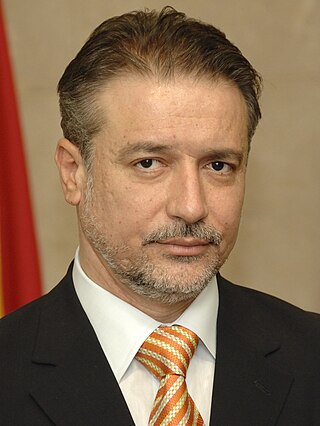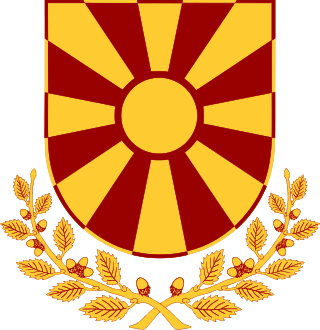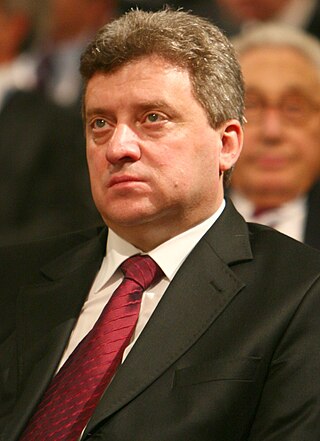
Branko Crvenkovski is a Macedonian politician who served as the 3rd President of Macedonia from 2004 to 2009. He previously served as Prime Minister of Macedonia from 1992 to 1998 and from 2002 to 2004.

The Social Democratic Union of Macedonia is a social democratic political party, and the main centre-left party in North Macedonia. The party is pro-European.

The Liberal Party of Macedonia was a conservative-liberal political party in North Macedonia. The party was a member of the Alliance of Liberals and Democrats for Europe Party. Its last chairman was Ivon Velichkovski.

The president of the Republic of North Macedonia is the head of state of North Macedonia.

Parliamentary elections were held in Macedonia on 18 October 1998, with a second round on 1 November. VMRO-DPMNE emerged as the largest party, winning 49 of the 120 seats, and later formed a coalition government with Democratic Alternative and the Democratic Party of Albanians.
Tito Petkovski is a Macedonian politician, and leader of the New Social Democratic Party.

Presidential elections were held in Macedonia in 2009. The first round was held on 22 March, alongside local elections. As no candidate received more than 50% of the vote, a run-off round was held on 5 April 2009, which was won by Gjorge Ivanov of the center-right VMRO-DPMNE party. Incumbent President Branko Crvenkovski did not stand for re-election.

Gjorge Ivanov is a Macedonian politician, who served as the 4th President of North Macedonia from 2009 to 2019.

The Liberal Democratic Party is a social-liberal political party in North Macedonia. The Liberal Democratic Party was launched in April 1997 as a merger between the Liberal Party and the Democratic Party. The first leader of the party was Petar Goshev from the Democrats, who was also the last president of the League of Communists of Macedonia. When the Liberal Party was re-established in 1999, a significant portion of the former Liberal Party remained in LDP.

General elections were held in Macedonia on 16 October 1994 to elect a President and Assembly, with a second round of Assembly elections on 30 October. The presidential election was won by Kiro Gligorov of the Alliance for Macedonia, whilst the parties forming Alliance for Macedonia also won the Assembly elections with 95 of the 120 seats. However, the second round of the Assembly elections were boycotted by VMRO-DPMNE and the Democratic Party, as they claimed there had been irregularities in the first round.

Presidential elections were held in Macedonia on 31 October 1999, with a second round on 14 November. Tito Petkovski of the Social Democratic Union won the first round. However, as he received less than 50% of the vote, the election went to a second round, which was won by Boris Trajkovski of VMRO-DPMNE, who won 53.2% of the vote.

The sixth local elections for the election of local mayors of the municipalities of the Republic of Macedonia and members of municipality councils were held on schedule in 2013. There were two large coalitions on the elections: the Coalition for a Better Macedonia led by VMRO-DPMNE and the Union for the Future led by SDSM. Also present on the elections was the Democratic Union for Integration (DUI), Democratic Party of Albanians (DPA) and the Union of Roma Forces. There was also coalition made between the two major rival parties VMRO-DPMNE and SDSM in Kičevo and Struga municipalities against the ethnic Albanian candidates Fatmir Dehari and Ramiz Merko of DUI. There were two rounds in the elections on March 24, 2013 and April 7, 2013. The first round of elections were declared the most peaceful elections in the history of independent Macedonia without any serious incidents. The elections were however not untainted, as the situation in the Centar Municipality was labeled as undemocratic by the Macedonian opposition with several voters being labeled as questionable for having only recently received their national ID cards and not being actual inhabitants of this respective municipality. The elections in this municipality lasted for three turns and were monitored by the foreign embassies.

General elections[a] were held in the Republic of Macedonia in April 2014 to elect the President and members of parliament. The first round of the presidential elections were held on 13 April, with incumbent president Gjorge Ivanov finishing first with 53% of the vote. However, as he did not receive the support of 50% of all registered voters, a second round was held on 27 April, alongside parliamentary elections, with Ivanov and the ruling coalition led by VMRO-DPMNE claiming victory as Ivanov was elected president and the VMRO-DPMNE won 61 of the 123 seats in the Assembly.

Stevo Pendarovski is a Macedonian politician who served as the 5th President of North Macedonia from 2019 to 2024.

The Democratic Party was a political party in Macedonia.
The following lists events that happened during 2014 in the Republic of Macedonia.

In April 2016, protests began in the Republic of Macedonia against the incumbent President Gjorge Ivanov and the government led by the interim Prime Minister Emil Dimitriev from the ruling VMRO-DPMNE party. Referred to by some as the Colorful Revolution, the protests started after the controversial decision by President Gjorge Ivanov to stop the investigation of former Prime Minister Nikola Gruevski and dozens of politicians who were allegedly involved in a wiretapping scandal. The demonstrations were organized by "Protestiram" and supported by a coalition led by the Social Democratic Union of Macedonia and other opposition parties, in addition to the newly formed Levica demanding that the government resign and be replaced by a transitional government and that the parliamentary elections planned for 5 June 2016 be cancelled, on the grounds that the conditions for free and transparent elections were not in place. The government and its supporters, who had organized pro-government rallies, maintained that the elections on June 5 were the only solution to the political crisis, with some observers blaming the opposition for creating a "Ukraine scenario" in Macedonia.
Local elections were held on October 14–15 and 28–29, 2017, in the Republic of Macedonia to elect mayors and members of municipality councils of the 80 municipalities in Macedonia. These were the sixth local elections since the independence of Macedonia.

Presidential elections were held in North Macedonia in 2019. Three candidates were on the ballot in the first round, held on 21 April: Stevo Pendarovski, supported by the ruling coalition led by the Social Democratic Union of Macedonia, including the Democratic Union for Integration; Gordana Siljanovska-Davkova of the leading opposition party VMRO-DPMNE, and Blerim Reka, an independent supported by Albanian opposition parties Alliance for Albanians and Besa Movement. The first round did not result in an absolute majority for any candidate, with Pendarovski receiving the most votes. In the second round held on 5 May, Pendarovski defeated Siljanovska-Davkova with 54% of the vote.

Parliamentary elections were held in North Macedonia on 8 May 2024. The slow pace of EU integration and corruption were the main issues during the campaign.















